| Listing 1 - 10 of 35 | << page >> |
Sort by
|
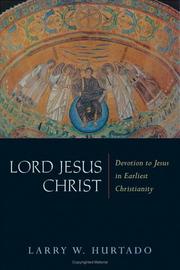
ISBN: 0802831672 9780802831675 Year: 2005 Publisher: Grand Rapids: Eerdmans,
Abstract | Keywords | Export | Availability | Bookmark
 Loading...
Loading...Choose an application
- Reference Manager
- EndNote
- RefWorks (Direct export to RefWorks)
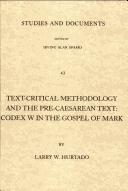
ISBN: 0802818722 9780802818720 Year: 1981 Volume: 43 Publisher: Grand Rapids: Eerdmans,
Abstract | Keywords | Export | Availability | Bookmark
 Loading...
Loading...Choose an application
- Reference Manager
- EndNote
- RefWorks (Direct export to RefWorks)
226.3 --- Evangelie volgens Marcus --- 27 <43> "1933/1945" --- Church and state --- -Christianity and state --- Separation of church and state --- State and church --- State, The --- Kerkgeschiedenis--Duitsland voor 1945 en na 1989--?"1933/1945" --- History --- -Congresses --- -Kerkgeschiedenis--Duitsland voor 1945 en na 1989--?"1933/1945" --- -History
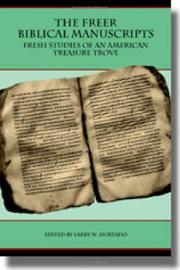
ISBN: 9781589832084 1589832086 Year: 2006 Volume: 6 Publisher: Atlanta: Society of biblical literature,
Abstract | Keywords | Export | Availability | Bookmark
 Loading...
Loading...Choose an application
- Reference Manager
- EndNote
- RefWorks (Direct export to RefWorks)
Freer Gallery of Art. --- Bible --- Manuscripts. --- Criticism, interpretation, etc. --- 22.014*2 --- Bijbel: geschiedenis en tekstkritiek van de grondtekst en vroege vertalingen --- Smithsonian Institution. --- Smithsonian Institution --- 22.014*2 Bijbel: geschiedenis en tekstkritiek van de grondtekst en vroege vertalingen --- Biblia --- Freer/Sackler
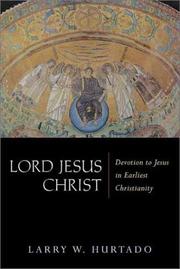
ISBN: 0802860702 9780802860705 Year: 2003 Publisher: Grand Rapids: Eerdmans,
Abstract | Keywords | Export | Availability | Bookmark
 Loading...
Loading...Choose an application
- Reference Manager
- EndNote
- RefWorks (Direct export to RefWorks)
Jesus Christ --- History of doctrines --- Cult --- History. --- Divinity --- 248.159.2 --- #GGSB: Dogmatiek --- #GGSB: Christologie --- #GGSB: Christendom --- Devotie tot Jezus Christus --- -Jesus Christ --- -Christ --- Cristo --- Jezus Chrystus --- Jesus Cristo --- Jesus, --- Jezus --- Christ, Jesus --- Yeh-su --- Masīḥ --- Khristos --- Gesù --- Christo --- Yeshua --- Chrystus --- Gesú Cristo --- Ježíš --- Isa, --- Nabi Isa --- Isa Al-Masih --- Al-Masih, Isa --- Masih, Isa Al --- -Jesus, --- Jesucristo --- Yesu --- Yeh-su Chi-tu --- Iēsous --- Iēsous Christos --- Iēsous, --- Kʻristos --- Hisus Kʻristos --- Christos --- Jesuo --- Yeshuʻa ben Yosef --- Yeshua ben Yoseph --- Iisus --- Iisus Khristos --- Jeschua ben Joseph --- Ieso Kriʻste --- Yesus --- Kristus --- ישו --- ישו הנוצרי --- ישו הנצרי --- ישוע --- ישוע בן יוסף --- المسيح --- مسيح --- يسوع المسيح --- 耶稣 --- 耶稣基督 --- 예수그리스도 --- Jíizis --- Yéshoua --- Iėsu̇s --- Khrist Iėsu̇s --- عيسىٰ --- -History --- -248.159.2 --- -Cult --- 248.159.2 Devotie tot Jezus Christus --- -#GGSB: Christendom --- Christ --- Bible. --- Ba-yon Tipan --- Bagong Tipan --- Jaji ma Hungi --- Kainē Diathēkē --- New Testament --- Nouveau Testament --- Novo Testamento --- Novum Testamentum --- Novyĭ Zavet --- Novyĭ Zavi︠e︡t Gospoda nashego Īisusa Khrista --- Novyĭ Zavit --- Nuevo Testamento --- Nuovo Testamento --- Nye Testamente --- Perjanjian Baru --- Dhamma sacʻ kyamʻʺ --- Injīl --- Theology. --- عيسىٰ --- Christendom --- Christologie --- Dogmatiek --- Jesus Christ - History of doctrines - Early church, ca. 30-600. --- Jesus Christ - Cult - History. --- Jesus Christ - Divinity - History of doctrines - Early church, ca 30-600
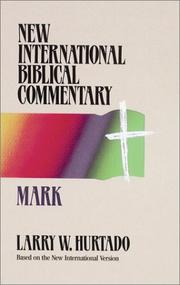
ISBN: 0943575168 9780943575162 Year: 1989 Volume: 2 Publisher: Peabody: Hendrickson Publishers,
Abstract | Keywords | Export | Availability | Bookmark
 Loading...
Loading...Choose an application
- Reference Manager
- EndNote
- RefWorks (Direct export to RefWorks)
Bible. --- Commentaries. --- 226.3 --- Evangelie volgens Marcus --- Marco (Book of the New Testament) --- Mark (Book of the New Testament) --- Markus (Book of the New Testament) --- Markusevangelium --- Vangelo di Marco --- Book of Mark
Book
ISBN: 9780567677716 0567677710 9780567677709 Year: 2018 Volume: 584 Publisher: New York: Bloomsbury,
Abstract | Keywords | Export | Availability | Bookmark
 Loading...
Loading...Choose an application
- Reference Manager
- EndNote
- RefWorks (Direct export to RefWorks)
The essays included in this volume present Larry W. Hurtado's steadfast analysis of the earliest Christian manuscripts. In these chapters, Hurtado considers not only standard text-critical issues which seek to uncover an earliest possible version of a text, but also the very manuscripts that are available to us. As one of the pre-eminent scholars of the field, Hurtado examines often overlooked 2nd and 3rd century artefacts, which are among the earliest manuscripts available, drawing fascinating conclusions about the features of early Christianity. Divided into two halves, the first part of the volume addresses text-critical and text-historical issues about the textual transmission of various New Testament writings. The second part looks at manuscripts as physical and visual artefacts themselves, exploring the metadata and sociology of their context and the nature of their first readers, for the light cast upon early Christianity. Whilst these essays are presented together here as a republished collection, Hurtado has made several updates across the collection to draw them together and to reflect on the developing nature of the issues that they address since they were first written.
Christian literature, Early --- 225 <08> --- 225 <08> Bible: Nouveau Testament--Verzamelwerken. Reeksen --- 225 <08> Bijbel: Nieuw Testament--Verzamelwerken. Reeksen --- Bible: Nouveau Testament--Verzamelwerken. Reeksen --- Bijbel: Nieuw Testament--Verzamelwerken. Reeksen --- Early Christian literature --- Patristic literature --- Criticism, Textual --- Bible. --- Ba-yon Tipan --- Bagong Tipan --- Jaji ma Hungi --- Kainē Diathēkē --- New Testament --- Nouveau Testament --- Novo Testamento --- Novum Testamentum --- Novyĭ Zavet --- Novyĭ Zavi︠e︡t Gospoda nashego Īisusa Khrista --- Novyĭ Zavit --- Nuevo Testamento --- Nuovo Testamento --- Nye Testamente --- Perjanjian Baru --- Dhamma sacʻ kyamʻʺ --- Injīl --- Criticism, Textual.
Book
ISBN: 1481304747 9781481304740 9781481304733 1481304739 9781481305396 9781481305389 9781481304757 Year: 2017 Publisher: Waco: Baylor university press,
Abstract | Keywords | Export | Availability | Bookmark
 Loading...
Loading...Choose an application
- Reference Manager
- EndNote
- RefWorks (Direct export to RefWorks)
"Silly," "stupid," "irrational," "simple." "Wicked," "hateful," "obstinate," "anti-social." "Extravagant," "perverse." The Roman world rendered harsh judgments upon early Christianity—including branding Christianity "new." Novelty was no Roman religious virtue. Nevertheless, as Larry W. Hurtado shows in Destroyer of the gods, Christianity thrived despite its new and distinctive features and opposition to them. Unlike nearly all other religious groups, Christianity utterly rejected the traditional gods of the Roman world. Christianity also offered a new and different kind of religious identity, one not based on ethnicity. Christianity was distinctively a "bookish" religion, with the production, copying, distribution, and reading of texts as central to its faith, even preferring a distinctive book-form, the codex. Christianity insisted that its adherents behave differently: unlike the simple ritual observances characteristic of the pagan religious environment, embracing Christian faith meant a behavioral transformation, with particular and novel ethical demands for men. Unquestionably, to the Roman world, Christianity was both new and different, and, to a good many, it threatened social and religious conventions of the day. In the rejection of the gods and in the centrality of texts, early Christianity obviously reflected commitments inherited from its Jewish origins. But these particular features were no longer identified with Jewish ethnicity and early Christianity quickly became aggressively trans-ethnic—a novel kind of religious movement. Its ethical teaching, too, bore some resemblance to the philosophers of the day, yet in contrast with these great teachers and their small circles of dedicated students, early Christianity laid its hard demands upon all adherents from the moment of conversion, producing a novel social project. Christianity’s novelty was no badge of honor. Called atheists and suspected of political subversion, Christians earned Roman disdain and suspicion in equal amounts. Yet, as Destroyer of the gods demonstrates, in an irony of history the very features of early Christianity that rendered it distinctive and objectionable in Roman eyes have now become so commonplace in Western culture as to go unnoticed. Christianity helped destroy one world and create another.
Church history --- Apostolic Church --- Christianity --- Church, Apostolic --- Early Christianity --- Early church --- Primitive and early church --- Primitive Christianity --- Church history - primitive and early church, ca. 30-600. --- Christian church --- 27 "00/02" --- 27 "00/02" Histoire de l'Eglise--?"00/02" --- 27 "00/02" Kerkgeschiedenis--?"00/02" --- Histoire de l'Eglise--?"00/02" --- Kerkgeschiedenis--?"00/02" --- Fathers of the church --- Great Apostasy (Mormon doctrine) --- History --- Religion --- Ancient --- Rome. --- History. --- Primitive and early church. --- 30-600. --- Church history - Primitive and early church, ca. 30-600.
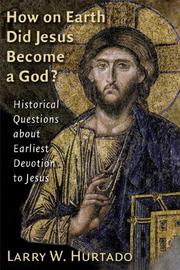
ISBN: 9780802828613 0802828612 Year: 2005 Publisher: Grand Rapids, Mich. Eerdmans
Abstract | Keywords | Export | Availability | Bookmark
 Loading...
Loading...Choose an application
- Reference Manager
- EndNote
- RefWorks (Direct export to RefWorks)
232 <09> --- 232.22 --- 248.159.2 --- 232.22 Goddelijkheid of godheid van Jezus Christus --- Goddelijkheid of godheid van Jezus Christus --- 248.159.2 Devotie tot Jezus Christus --- Devotie tot Jezus Christus --- Jezus Christus. Christologie: dogmatisch. De Verbo incarnato--Geschiedenis van .. --- Jesus Christ --- Christ --- Cristo --- Jezus Chrystus --- Jesus Cristo --- Jesus, --- Christ, Jesus --- Yeh-su --- Masīḥ --- Khristos --- Gesù --- Christo --- Yeshua --- Chrystus --- Gesú Cristo --- Ježíš --- Isa, --- Nabi Isa --- Isa Al-Masih --- Al-Masih, Isa --- Masih, Isa Al --- -Jesus, --- Jesucristo --- Yesu --- Yeh-su Chi-tu --- Iēsous --- Iēsous Christos --- Iēsous, --- Kʻristos --- Hisus Kʻristos --- Christos --- Jesuo --- Yeshuʻa ben Yosef --- Yeshua ben Yoseph --- Iisus --- Iisus Khristos --- Jeschua ben Joseph --- Ieso Kriʻste --- Yesus --- Kristus --- ישו --- ישו הנוצרי --- ישו הנצרי --- ישוע --- ישוע בן יוסף --- المسيح --- مسيح --- يسوع المسيح --- 耶稣 --- 耶稣基督 --- 예수그리스도 --- Jíizis --- Yéshoua --- Iėsu̇s --- Khrist Iėsu̇s --- عيسىٰ --- Cult --- History. --- History of doctrines --- Bible. --- Ba-yon Tipan --- Bagong Tipan --- Jaji ma Hungi --- Kainē Diathēkē --- New Testament --- Nouveau Testament --- Novo Testamento --- Novum Testamentum --- Novyĭ Zavet --- Novyĭ Zavi︠e︡t Gospoda nashego Īisusa Khrista --- Novyĭ Zavit --- Nuevo Testamento --- Nuovo Testamento --- Nye Testamente --- Perjanjian Baru --- Dhamma sacʻ kyamʻʺ --- Injīl --- Theology. --- Christology --- Jezus Christus. Christologie: dogmatisch. De Verbo incarnato--Geschiedenis van . --- Jezus Christus. Christologie: dogmatisch. De Verbo incarnato--Geschiedenis van
Book
ISBN: 0567665267 0567657728 9780567665263 9780567657725 9780567657718 0567657701 056765771X 9780567657701 0567657701 Year: 2015 Publisher: London, UK
Abstract | Keywords | Export | Availability | Bookmark
 Loading...
Loading...Choose an application
- Reference Manager
- EndNote
- RefWorks (Direct export to RefWorks)
"Larry Hurtado's One God, One Lord has been described as 'one of the most important and provocative Christologies of all time' (Alan F. Segal). The book has taken its place among works on Jesus as one consistently cited, consistently read, and consistently examined in scholarly discourse. Hurtado examines the early cultic devotion to Jesus through a range of Jewish sources. Hurtado outlines an early 'high' Christological theology, showing how the Christ of faith emerges from monotheistic Judaism. The book has already found a home on the shelves of many in its two previous editions. In this new Cornerstones edition Hurtado provides a substantial epilogue of some twenty-thousand words, which brings this ground-breaking work to the fore once more, in a format accessible to scholars and students alike."--Bloomsbury Publishing Larry Hurtado's One God, One Lord has been described as 'one of the most important and provocative Christologies of all time' (Alan F. Segal). The book has taken its place among works on Jesus as one consistently cited, consistently read, and consistently examined in scholarly discourse. Hurtado examines the early cultic devotion to Jesus through a range of Jewish sources. Hurtado outlines an early 'high' Christological theology, showing how the Christ of faith emerges from monotheistic Judaism. The book has already found a home on the shelves of many in its two previous editions. In this new Cornerstones edition Hurtado provides a substantial epilogue of some twenty-thousand words, which brings this ground-breaking work to the fore once more, in a format accessible to scholars and students alike
Jewish Christians --- God (Judaism) --- Christianity --- Christianity and other religions --- Judaism --- Brotherhood Week --- Church --- History --- History of doctrines. --- Origin. --- Judaism. --- Relations --- Christianity. --- Foundation --- Jesus Christ --- Christ --- Cristo --- Jezus Chrystus --- Jesus Cristo --- Jesus, --- Christ, Jesus --- Yeh-su --- Masīḥ --- Khristos --- Gesù --- Christo --- Yeshua --- Chrystus --- Gesú Cristo --- Ježíš --- Isa, --- Nabi Isa --- Isa Al-Masih --- Al-Masih, Isa --- Masih, Isa Al --- -Jesus, --- Jesucristo --- Yesu --- Yeh-su Chi-tu --- Iēsous --- Iēsous Christos --- Iēsous, --- Kʻristos --- Hisus Kʻristos --- Christos --- Jesuo --- Yeshuʻa ben Yosef --- Yeshua ben Yoseph --- Iisus --- Iisus Khristos --- Jeschua ben Joseph --- Ieso Kriʻste --- Yesus --- Kristus --- ישו --- ישו הנוצרי --- ישו הנצרי --- ישוע --- ישוע בן יוסף --- المسيح --- مسيح --- يسوع المسيح --- 耶稣 --- 耶稣基督 --- 예수그리스도 --- Jíizis --- Yéshoua --- Iėsu̇s --- Khrist Iėsu̇s --- عيسىٰ --- History of doctrines
Book
Year: 2010 Publisher: Nashville, Tenn. Abingdon
Abstract | Keywords | Export | Availability | Bookmark
 Loading...
Loading...Choose an application
- Reference Manager
- EndNote
- RefWorks (Direct export to RefWorks)
| Listing 1 - 10 of 35 | << page >> |
Sort by
|

 Search
Search Feedback
Feedback About UniCat
About UniCat  Help
Help News
News